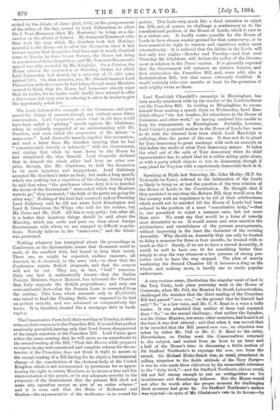The Lords followed the example of the Commons, and post-
poned the debate of censure, though not without some bitter conversation. Lord Carnarvon made what in old days would have been called a "girding" speech against Mr. Gladstone, whom he evidently suspected of an understanding with Mr. Goschen, and even called the suspension of the debate a manoeuvre." Lord Granville warmly repelled this accusation ; and read a letter from Mr. Goschen denying that he had " communicated directly or indirectly " with the Government, and stating that when he went down to the House he had abandoned the idea himself. Lord Granville declared that to himself the whole affair had been an utter sur- prise, though, like Mr. Gladstone, he held the discussion to be most injurious and inopportune. Lord Salisbury accepted Mr. Goschen's letter as final ; but made a long speech, which was nothing but a repetition of the charge, daring which he said that when "the gentlemen whose duty it is to marshal the forces of the Government " were asked which way Members were to go," they answered, " the bulk of the party are going the other way." Nothing of the kind had occurred ; and on Thursday Lord Salisbury said he did not mean Lord Kensington and Lord R. Grosvenor, the Whips who told for the motion, but Mr. Cotes and Mr. Duff. All this is very petty ; but, after all, it is better that injurious things should be said about the Ministry, which can smile and pass on, than about foreign Governments with whom we are engaged in difficult negotia- tions. Nobody believes in the "manoeuvre," and the debate was prevented.










































 Previous page
Previous page